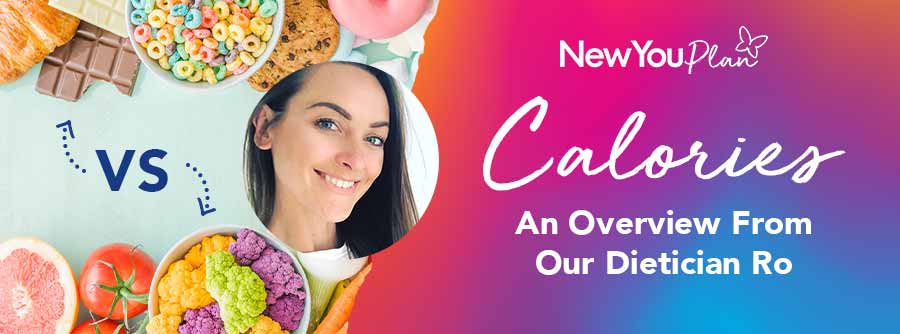
Calories – An Overview from our Dietician
Calories – an overview
What is a calorie?
The amount of energy in an item of food and drink is measured in calories. The energy we take in via calories is important as it is needed to fuel all of our body’s internal processes as well as our physical movements such as breathing and our daily activities (1).
An average man needs 2500 calories per day and an average woman needs 2000 calories per day however these values vary depending on the person’s size, age, level of physical activity among others – not everyone needs exactly the same amounts. To put it simply, if we eat more calories than we require over a sustained period of time, these excess calories or energy is stored as body fat, leading to us becoming a higher weight.
A way of losing excess weight is to reduce the calories we take in and/or increase the amount we expend through exercise to create a calorie deficit. The calorie deficit means that our body will use its fat stores as energy, which creates a weight loss. The bigger the calorie deficit, the greater the weight loss. However, it is important that if you do consider long-term management and sustainability of a diet when considering a weight loss plan.
Are all created calories equal?
The answer to this can be both yes and no.
The answer is yes in that 100 calories of apple provides the same amount of energy as 100 calories of sweets however, as most of us know, these are two very different foods and aside from their energy content, have profoundly different effects on the body and are processed in different ways so in that way the answer is also no.
To understand this we need to think about what each of these foods contains in more detail, an apple contains fibre, a type of carbohydrate, alongside natural sugar, the fibre content of the apple allows the sugars to be digested more slowly and so they do not cause our blood sugars to rise as quickly as they would if we ate the same amount of calories from sweets. Foods with a high glycaemic index, such as sweets or refined grains, cause a sharp rise in our blood sugars and can lead to increased hunger and cravings compared to foods that do not affect our blood sugars as much, and can lead to us to consume more calories later in the day.
The three macronutrients, protein, carbohydrate and fat are all broken down by the body in different ways. It takes a little more energy for us to break down protein than it does for us to break down either fat or carbohydrate (2), therefore a diet a little higher in protein can help us with our energy balance and weight management.
Protein is also the most satiating of the three macronutrients (3) due to its effects on our hunger hormones (4) and so foods with an increased protein content can help to reduce hunger and food intake aiding with both weight loss and weight maintenance.
Fat, protein and carbohydrate also contain different amounts of calories per gram. Fat for example contains 9 calories per gram whereas carbohydrate and protein both contain 4 calories per gram (5). Therefore lowering intake of foods high in fat, such as fast and processed foods can help to reduce the amount of calories we take in.
Should we count calories?
Calorie counting is not essential for weight loss, but it can be a useful tool for some. Calorie counting, especially when doing it for the first time can be very insightful and will provide education on which foods have higher amounts of calories and which foods have lower amounts of calories so can help to guide your choices. Calorie counting doesn’t need to be a long-term intervention. Once you feel educated on calorie values, you can move more towards a state of calorie awareness whereby you may use calories to guide your choices on occasion, but not all things in your diet are rigidly counted.
However, some people may not find calories useful, and calorie counting may have a negative effect on some people. Different things work for different people so be receptive to what works for you and what doesn’t.
The bottom line
A focus on calories isn’t essential for weight loss or good health but calories can be a useful indication of the energy content of different foods which can be useful when somebody is trying to manage their weight. Calories are one part of the nutritional profile of a food, so don’t forget about the importance of nutrient provision too.
References
- Understanding calories – NHS [Internet]. [cited 2021 Feb 25]. Available from: https://www.nhs.uk/live-well/healthy-weight/understanding-calories/
- Westerterp KR. Diet induced thermogenesis. Nutr Metab). 2004 Aug 18;1(1):5. doi: 10.1186/1743-7075-1-5. Available from: https://www.ncbi.nlm.nih.gov/pmc/articles/PMC524030/
- Weigle DS, Breen PA, Matthys CC, Callahan HS, Meeuws KE, Burden VR, et al. A high-protein diet induces sustained reductions in appetite, ad libitum caloric intake, and body weight despite compensatory changes in diurnal plasma leptin and ghrelin concentrations. Am J Clin Nutr [Internet]. 2005 [cited 2021 Feb 25];82(1):41–8. Available from: https://pubmed.ncbi.nlm.nih.gov/16002798/
- Lejeune MPGM, Westerterp KR, Adam TCM, Luscombe-Marsh ND, Westerterp-Plantenga MS. Ghrelin and glucagon-like peptide 1 concentrations, 24-h satiety, and energy and substrate metabolism during a high-protein diet and measured in a respiration chamber. Am J Clin Nutr [Internet]. 2006 Jan 1 [cited 2021 Feb 25];83(1):89–94. Available from: https://pubmed.ncbi.nlm.nih.gov/16400055/
- What is energy? – British Nutrition Foundation [Internet]. [cited 2021 Feb 25]. Available from: https://www.nutrition.org.uk/healthyliving/basics/what-is-energy.html





